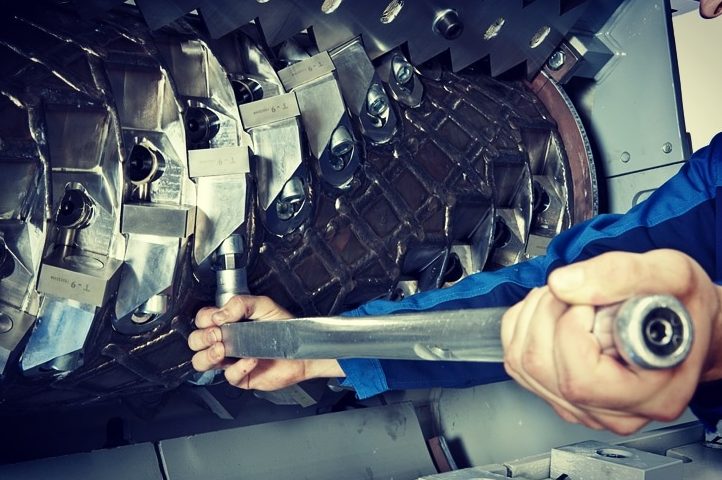The failure of blades in industrial machines not only affects productivity but can also lead to high costs, significant machinery damage, and loss of valuable materials. In industrial environments, where every minute counts, a defective blade can completely halt production and severely impact delivery schedules.
These tools, although they may seem like a minor component within the equipment, play an essential role in efficiency and quality of operations. Understanding the most common causes of blade failure and applying proper preventive strategies is key to maintaining a continuous and profitable workflow.
In this article, we delve into the main reasons why blades fail, how they affect your processes, and what measures you can implement to minimize risks and costs in the long run.
Why Are Machine Blades Important?
Before diving into the causes of blade failure, it is essential to highlight how critical they are to the proper functioning of industrial machines. Although they are often overlooked due to their size or apparent simplicity, their role in processing and cutting operations is crucial.
Industrial blades ensure precise, consistent, and efficient cuts, which not only improve the quality of the final product but also reduce waste and optimize productivity. Additionally, proper maintenance of these tools can extend the lifespan of the machinery, minimizing costs associated with repairs or replacements.
In summary, investing in high-quality blades and their care is not just good practice but a key strategy to ensure profitable and uninterrupted operations. Industrial blades are much more than simple components: they are the heart of cutting and processing operations.

When a blade fails, the repercussions can be more severe than they initially appear. Internal components of the machine can suffer significant damage, affecting its functionality and resulting in high repair costs. Additionally, processed or packaged materials may become unusable, leading to economic losses and waste of resources. This type of failure can also cause unexpected production stoppages, generating downtime that directly impacts delivery schedules and the profitability of operations.
Main Causes of Blade Failure
The failure of machine blades is often due to common causes that, fortunately, can be resolved or prevented with appropriate measures. Below, we examine the main problems and their solutions.
Incorrect Use
When a blade is used for a task it was not designed for, the risk of breakage is almost inevitable. For example, attempting to cut overly dense materials with inappropriate blades can result in failures due to overload.
Solution: Acquire blades from specialized manufacturers who understand the needs of your industry. These companies design specific tools for particular applications, ensuring durability and performance.
Lack of Break-In
Whenever a blade is new, it is advisable to ensure it undergoes a “break-in” period before being subjected to its full production speed/cycle.
By allowing the machine blade time to settle, you enable the sharpened section of the blade to wear in. Depending on the exact piece of machinery used, you should consider operating the blade at a reduced feed rate of 50% for about five minutes before increasing it to full speed.
Solution: In addition to properly “breaking in” blades, you can ensure the process by purchasing your machine blades from a manufacturer that thoroughly assesses the quality of every blade before it leaves their factory.
This ensures the blades you receive are perfect and will not cause issues during use.
Incorrect Fitting
Another common cause of blade failure is improper installation. When a blade is not positioned correctly, it is subjected to too much (or too little) tension or placed at an incorrect angle, significantly increasing the likelihood of failure.
It is crucial to ensure that blades are installed following the instructions provided by the machine manufacturer. Additionally, low-quality blades, especially generic and economical ones, often fail due to not meeting OEM-equivalent standards.
Solution: Avoid these problems by purchasing blades designed with precision, manufactured under strict tolerances, and specifically adapted to the machinery for which they are intended. High-quality blades ensure perfect installation and reliable performance, preventing interruptions and unnecessary costs.
Poor Maintenance
Failing to properly maintain blades significantly increases the risk of premature failures and deterioration. Blades should be inspected and cleaned regularly to ensure efficient and high-quality cutting. Additionally, depending on the materials being cut, periodic lubrication may be required to reduce wear.
Solution: Implement a regular maintenance program that includes inspections, cleaning, and regrinding as soon as a decline in cutting performance is detected.
At Cuchillas Castillo, we offer a professional regrinding service that revitalizes your blades and extends their lifespan, ensuring optimal performance at all times.
Poor Quality
The primary cause of machine blade failures ultimately lies in poor-quality design, materials, and manufacturing. While it may be tempting to cut costs by purchasing generic, cheap blades, this often proves to be a false economy.
Low-quality blades are destined to fail, causing production stoppages, downtime, machinery damage, and defective products.
Solution: Investing in high-quality industrial blades is the key to avoiding these problems. High-quality blades are precisely designed, made from superior-grade hardened steel, and available with a variety of coatings and additional options. Although they may have a higher initial cost, their durability and long-term performance make them much more cost-effective.
It is also important to review the manufacturer’s service levels, as a quick response can make a significant difference when you need new blades urgently.
Buy the Best, Buy from Cuchillas Castillo
At Cuchillas Castillo, we understand that every industrial operation is unique and that the quality of tools directly impacts performance and profitability. That is why we design and manufacture high-precision industrial blades, tailored to the specific needs of each client.
With decades of experience in the industry, we offer a comprehensive catalog that includes blades for recycling, handling, and more. Additionally, our services include professional regrinding and technical support to ensure your blades maintain optimal performance throughout their lifecycle.

Whether you need a completely customized blade or an urgent solution, at Cuchillas Castillo, we are committed to meeting your needs quickly and efficiently. Contact us and discover how we can help you.
.

